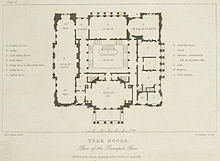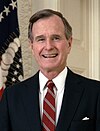| 17th G7 summit | |
|---|---|
 Lancaster House in London Lancaster House in London | |
| Host country | United Kingdom |
| Dates | 15–17 July 1991 |
| Follows | 16th G7 summit |
| Precedes | 18th G7 summit |
The 17th G7 Summit was held in England between 15 and 17 July 1991. The venue for the summit meetings was Lancaster House in London.
The Group of Seven (G7) was an unofficial forum which brought together the heads of the richest industrialized countries: France, Germany, Italy, Japan, the United Kingdom, the United States, Canada (since 1976), and the President of the European Commission (starting officially in 1981). The summits were not meant to be linked formally with wider international institutions; and in fact, a mild rebellion against the stiff formality of other international meetings was a part of the genesis of cooperation between France's president Valéry Giscard d'Estaing and West Germany's chancellor Helmut Schmidt as they conceived the first Group of Six (G6) summit in 1975.
Leaders at the summit

The G7 is an unofficial annual forum for the leaders of Canada, the European Commission, France, Germany, Italy, Japan, the United Kingdom, and the United States.
The 17th G7 summit was the first summit for British Prime Minister John Major. It was also the last summit for Italian Prime Minister Giulio Andreotti and Japanese Prime Minister Toshiki Kaifu.
Participants
These summit participants are the current "core members" of the international forum:
| Core G7 members Host state and leader are shown in bold text. | |||
| Member | Represented by | Title | |
|---|---|---|---|
| Canada | Brian Mulroney | Prime Minister | |
| France | François Mitterrand | President | |
| Germany | Helmut Kohl | Chancellor | |
| Italy | Giulio Andreotti | Prime Minister | |
| Japan | Toshiki Kaifu | Prime Minister | |
| United Kingdom | John Major | Prime Minister | |
| United States | George H. W. Bush | President | |
| European Community | Jacques Delors | Commission President | |
| Ruud Lubbers | Council President | ||
| Guest Invitees (Countries) | |||
| Member | Represented by | Title | |
| Soviet Union | Mikhail Gorbachev | President | |
Major sent a letter to other members of the G7, asking for their permission to invite Mikhail Gorbachev, who has been pressing to come to London to plead for more Western economic support for his country. Pressure to invite Gorbachev had come mainly from the leaders of France, Germany, and Italy who have made public appeals for him to be invited to attend; but Britain sent the official invitation inviting the Soviet Union to participate. A wry comment which was oft repeated during the summit was that G7 had become the G8½ with the participation of the European Community and the meetings with Gorbachev.
Issues

The summit was intended as a venue for resolving differences among its members. As a practical matter, the summit was also conceived as an opportunity for its members to give each other mutual encouragement in the face of difficult economic decisions. In anticipation of this conference, a new 35-foot-long table was built for the Long Gallery, where the main negotiating sessions were planned to unfold. Issues which were discussed at this summit included:
- Economic Policy
- International Trade
- Energy
- Central and Eastern Europe
- The Soviet Union
- The Middle East
- The Developing Countries and Debt
- Environment
- Drugs
- Migration
Accomplishments
In 1991, the summit leaders proclaimed "concern" about protecting existing forests, but there is little evidence of follow-up action.
Gallery of participating leaders
Core G7 participants
-

 Canada
Canada
Brian Mulroney,
Prime Minister -

 France
France
François Mitterrand,
President -

 Germany
Germany
Helmut Kohl,
Chancellor -

 Italy
Italy
Giulio Andreotti,
Prime Minister -

 Japan
Japan
Toshiki Kaifu,
Prime Minister -

 United Kingdom
United Kingdom
John Major,
Prime Minister (Host) -

 United States
United States
George H. W. Bush,
President
Guest Invitees
See also
Notes
- ^ Japan, Ministry of Foreign Affairs (MOFA): Summit Meetings in the Past.
- Saunders, Doug. "Weight of the world too heavy for G8 shoulders," Archived 2008-10-11 at the Wayback Machine Globe and Mail (Toronto). July 5, 2008 -- n.b., the G7 becomes the Group of Eight (G7) with the inclusion of Russia starting in 1997.
- ^ Reuters: "Factbox: The Group of Eight: what is it?", July 3, 2008.
- ^ Reinalda, Bob and Bertjan Verbeek. (1998). Autonomous Policy Making by International Organizations, p. 205.
- Rieffel, Lex. "Regional Voices in Global Governance: Looking to 2010 (Part IV)," Archived June 3, 2010, at the Wayback Machine Brookings. March 27, 2009; "core" members (Muskoka 2010 G-8, official site). Archived June 2, 2010, at the Wayback Machine
- MOFA: Summit (17); European Union: "EU and the G8" Archived 2007-02-26 at the Wayback Machine
- Schmidt, William E. "Britain Is Proposing to Invite Gorbachev to London Talks," New York Times. June 7, 1991.
- ^ Apple, R.W. "Reporter's Notebook; British Hosts, Being British, Plan an Understated Splendor," New York Times. July 15, 1991.
- Sadruddin, Aga Khan. "It's Time to Save the Forests," New York Times. July 19, 2000.
References
- Bayne, Nicholas and Robert D. Putnam. (2000). Hanging in There: The G7 and G8 Summit in Maturity and Renewal. Aldershot, Hampshire, England: Ashgate Publishing. ISBN 978-0-7546-1185-1; OCLC 43186692
- Reinalda, Bob and Bertjan Verbeek. (1998). Autonomous Policy Making by International Organizations. London: Routledge. ISBN 978-0-415-16486-3; ISBN 978-0-203-45085-7; OCLC 39013643
External links
- No official website is created for any G7 summit prior to 1995 -- see the 21st G7 summit.
- University of Toronto: G8 Research Group, G8 Information Centre




